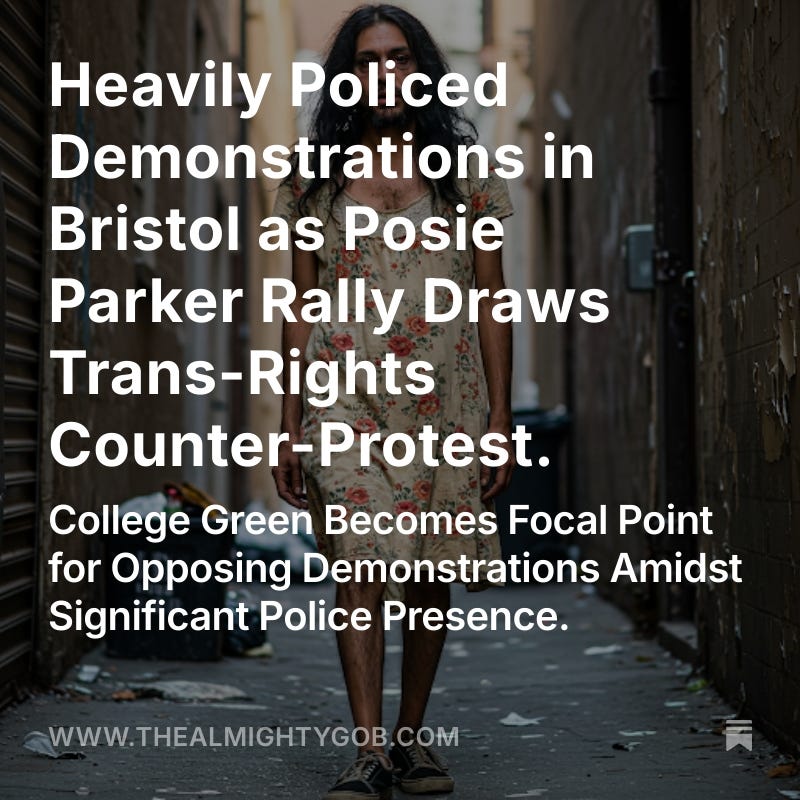Heavily Policed Demonstrations in Bristol as Posie Parker Rally Draws Trans-Rights Counter-Protest.
College Green Becomes Focal Point for Opposing Demonstrations Amidst Significant Police Presence.
A significant police presence was observed throughout Bristol City Centre on Sunday, April 13th, as a rally organised by Kellie-Jay Keen, known as Posie Parker, coincided with a counter-protest staged by trans-rights advocates. The convergence of these opposing demonstrations at College Green necessitated a substantial deployment of Avon and Somerset Police resources, including vans, mounted officers, and numerous uniformed personnel.
The "Let Women Speak" rally, spearheaded by Kellie-Jay Keen, a British campaigner identifying as an anti-transgender and gender-critical activist, took place between 1:00 PM and 3:00 PM on College Green. Keen, known for popularising the controversial slogan "adult human female," has been organising these events across the United Kingdom to provide a platform for women to discuss issues they deem important.
During her address to attendees in Bristol, Posie Parker alluded to the presence of counter-protesters, suggesting their aim was to intimidate those speaking at her rally. She asserted, "Walking past, that isn't such a big crowd, and that's because when women, and men, but when women come to speak about this issue, those nice men, some of them in dresses, come out to intimidate women because they don't like us speaking."
Parker then reiterated several of her well-known stances on gender identity, stating, "'And what is it that we say everyone? Well, we say 'no woman has a penis'. 'No man has a vagina'. There's no such thing as non-binary, and transitioning children is profound abuse." Notably, Keen also made a personal remark about her past connection to the city, saying, "I used to live in Bristol and I'm very pleased looking at Bristol and seeing what's happened over the last decade, I'm actually really happy that I left. So, I'm sorry."
The presence of the anti-transgender rally spurred a swift response from local trans-rights advocates, who organised a counter-protest under the banner of "Protect Our Queer Streets." These protesters mobilised in opposition to Posie Parker's views and aimed to demonstrate solidarity with the transgender community.
Organisers of the counter-protest actively encouraged participants to bring face coverings and musical instruments, specifically mentioning tambourines, with the intention of creating a vibrant and visible display of opposition. Their stated goal was to "show [Posie Parker] that the streets of Bristol always have been and always will be queer and trans."
Eyewitness accounts, along with accompanying pictures and videos from the scene, clearly illustrated the significant police presence deployed to manage the two distinct groups of demonstrators. Police vans and officers on horseback were highly visible, alongside a large number of foot patrol officers. The footage also captured moments of police intervention, showing officers engaging with individuals and directing them away from the main event.
Following the conclusion of the rallies, Posie Parker took to social media to comment on the police's handling of the event. In her post, she stated, "This afternoon @ASPolice sent a clear message to women, that they will keep us safe when we want to speak in public about our rights." This statement suggests her satisfaction with the level of security provided by the police during her rally.
However, the issues raised extend beyond the immediate events of the rally. The experiences of post-operative transgender women, marked by significant medical, social, and emotional journeys, can lead to feelings of devaluation when individuals superficially present as female without the profound lived experience of being transgender. For many trans women, their transition is a deeply personal and often arduous process undertaken to alleviate the distress of gender dysphoria and to live authentically in their affirmed gender. The concern arises that those who adopt a female presentation without this underlying reality may inadvertently trivialise the seriousness of gender dysphoria and the immense commitment involved in a genuine transition. This can be deeply invalidating for trans women who have navigated substantial hurdles to align their inner sense of self with their outward presentation.
Furthermore, there are valid concerns regarding the potential for stereotyping, safety, and the motives behind such superficial presentations. Some fear that these individuals might perpetuate harmful misconceptions about transgender women, reducing their identities to mere aesthetics or objects of fetishisation, thereby hindering the broader acceptance and understanding of genuine transgender experiences and potentially fueling transphobia. The worry that individuals not genuinely transgender might infiltrate women's spaces under false pretenses also raises significant safety and trust issues within vulnerable communities. Additionally, the concern that some may be motivated by sexual fetishism rather than authentic gender identity can be deeply upsetting and objectifying for trans women striving for genuine recognition and respect.
It's crucial to acknowledge the complexity and sensitivity surrounding the perspectives of individuals like Posie Parker on the topic of transgender women and women's rights. Their objections often stem from a belief that biological sex is immutable and fundamental to the category of "woman." Consequently, they may argue that individuals born male, regardless of their gender identity or presentation, retain inherent male traits and societal advantages that could compromise the safety and integrity of spaces and rights specifically designated for biological women. Concerns are frequently raised regarding access to single-sex spaces like toilets and shelters, participation in women's sports, and the potential erasure of the distinct experiences and challenges faced by those who have lived their entire lives as women.
Furthermore, this perspective often views the inclusion of transgender women in the category of "woman" as a dilution of the meaning of womanhood, potentially undermining the historical and ongoing struggle for women's equality based on their biological sex. They may argue that focusing on gender identity over biological sex could detract from addressing issues uniquely affecting biological women, such as reproductive rights and gender-based violence perpetrated by biological males. This viewpoint emphasises the conflict between the rights and needs of transgender women and cisgender women, advocating for the prioritisation and protection of the latter based on their own realities.
I would have had more empathy had the so-called ‘trans’ turnout not been a showcase for a cosplay lifestyle where the attendees appeared in masks, as if they were contagious. You know, like COVID in drag—and bad, unkempt drag at that. For people who usually don’t give a damn what they look like in public—you know, a week of facial stubble in a dress—the lack of effort didn’t change, just a bizarre desire to cover the stubble, as if, for once, embarrassed by it, perhaps. Then, they wonder why so many females by birth, and genuine trans people are so against them?
Personally, I believe people should be whoever they choose to be on this great, world stage of life. I respect those who just get on with their lives for being so without fuss and attention-seeking. Good luck to them all, and, in Star Trek terminology, as Spock would say, ‘Live long and prosper.’
As for the rest, at least make a bloody effort to live your dream, and tidy up.



